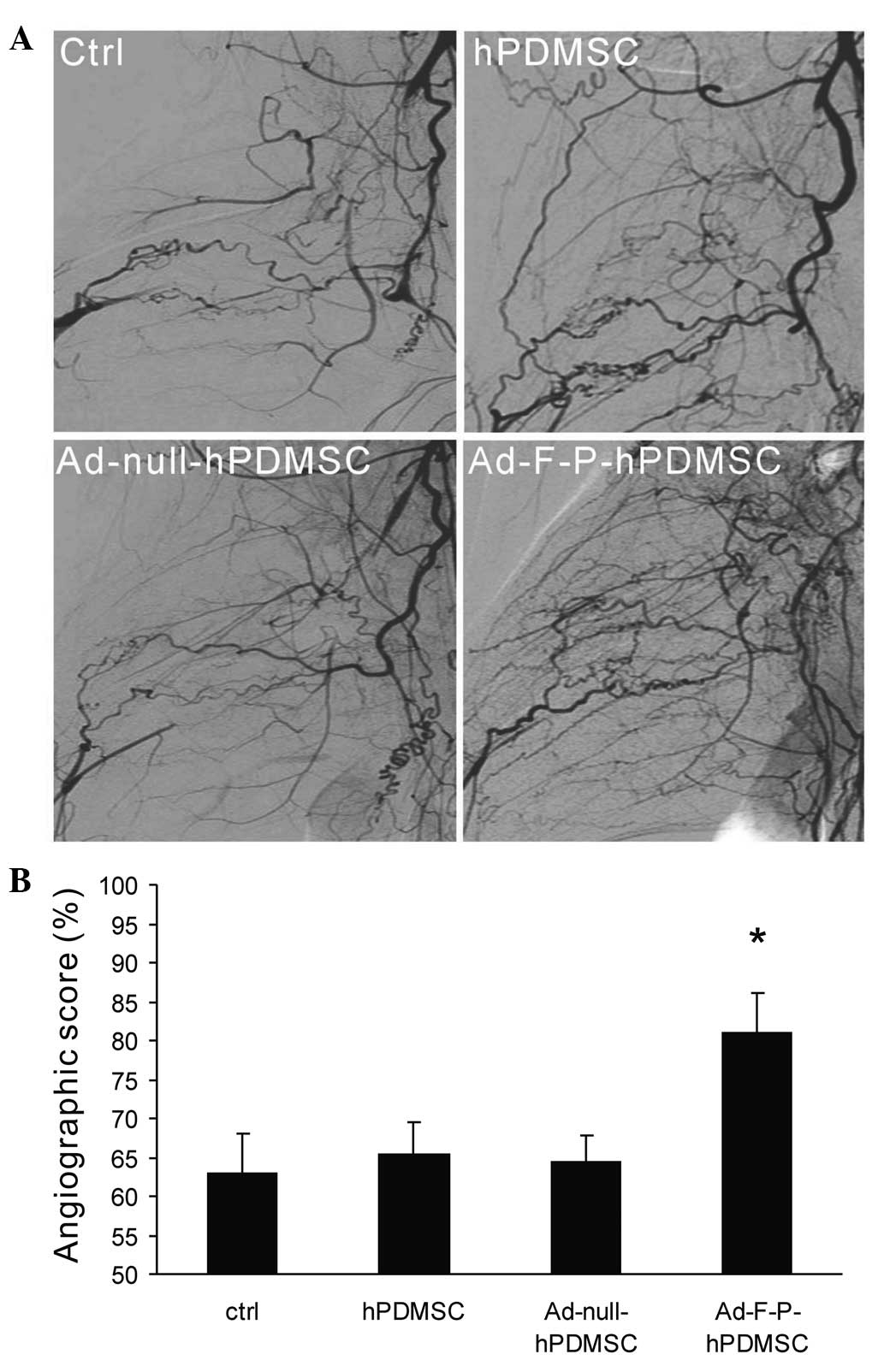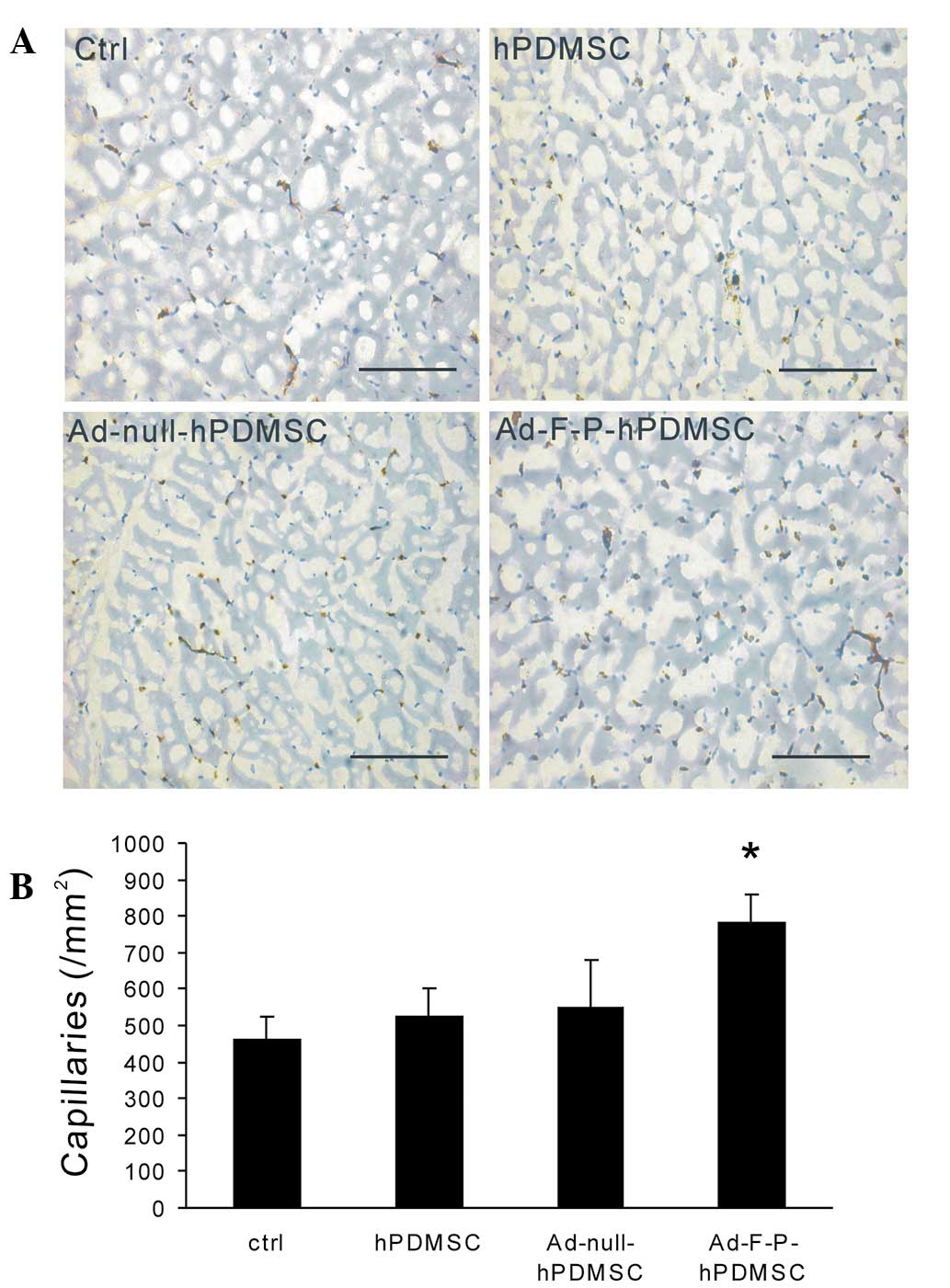|
1
|
Vincent KA, Shyu KG, Luo Y, et al:
Angiogenesis is induced in a rabbit model of hindlimb ischemia by
naked DNA encoding a HIF-1alpha/VP16 hybrid transcription factor.
Circulation. 102:2255–2261. 2000. View Article : Google Scholar : PubMed/NCBI
|
|
2
|
Emanueli C, Salis MB, Pinna A, Graiani G,
Manni L and Madeddu P: Nerve growth factor promotes angiogenesis
and arteriogenesis in ischemic hindlimbs. Circulation.
106:2257–2262. 2002. View Article : Google Scholar : PubMed/NCBI
|
|
3
|
Luttun A, Tjwa M, Moons L, et al:
Revascularization of ischemic tissues by PIGF treatment, and
inhibition of tumor angiogenesis, arthritis and atherosclerosis by
anti-Flt1. Nat Med. 8:831–840. 2002.PubMed/NCBI
|
|
4
|
Dor Y, Djonov V, Abramovitch R, et al:
Conditional switching of VEGF provides new insights into adult
neovascularization and pro-angiogenic therapy. EMBO J.
21:1939–1947. 2002. View Article : Google Scholar : PubMed/NCBI
|
|
5
|
Asahara T, Bauters C, Zheng LP, et al:
Synergistic effect of vascular endothelial growth factor and basic
fibroblast growth factor on angiogenesis in vivo. Circulation.
92(Suppl): II365–II371. 1995. View Article : Google Scholar : PubMed/NCBI
|
|
6
|
Ieda Y, Fujita J, Ieda M, et al: G-CSF and
HGF: Combination of vasculogenesis and angiogenesis synergistically
improves recovery in murine hind limb ischemia. J Mol Cell Cardiol.
42:540–548. 2007. View Article : Google Scholar : PubMed/NCBI
|
|
7
|
Jay SM, Shepherd BR, Andrejecsk JW,
Kyriakides TR, Pober JS and Saltzman WM: Dual delivery of VEGF and
MCP-1 to support endothelial cell transplantation for therapeutic
vascularization. Biomaterials. 31:3054–3062. 2010. View Article : Google Scholar : PubMed/NCBI
|
|
8
|
Lindner V, Lappi DA, Baird A, Majack RA
and Reidy MA: Role of basic fibroblast growth factor in vascular
lesion formation. Circ Res. 68:106–113. 1991. View Article : Google Scholar : PubMed/NCBI
|
|
9
|
van Royen N, Piek JJ, Buschmann I, Hoefer
I, Voskuil M and Schaper W: Stimulation of arteriogensis; a new
concept for the treatment of arterial occlusive disease. Cardiovasc
Res. 49:543–553. 2001. View Article : Google Scholar : PubMed/NCBI
|
|
10
|
Raines EW: PDGF and cardiovascular
disease. Cytokine Growth Factor Rev. 15:237–254. 2004. View Article : Google Scholar : PubMed/NCBI
|
|
11
|
Greenberg JI, Shields DJ, Barillas SG, et
al: A role for VEGF as a negative regulator of pericyte function
and vessel maturation. Nature. 456:809–813. 2008. View Article : Google Scholar : PubMed/NCBI
|
|
12
|
Cao R, Bråkenhielm E, Pawliuk R, et al:
Angiogenic synergism, vascular stability and improvement of
hind-limb ischemia by a combination of PDGF-BB and FGF-2. Nat Med.
9:604–613. 2003. View
Article : Google Scholar : PubMed/NCBI
|
|
13
|
Hao X, Månsson-Broberg A, Gustafsson T, et
al: Angiogenic effects of dual gene transfer of bFGF and PDGF-BB
after myocardial infarction. Biochem Biophys Res Commun.
315:1058–1063. 2004. View Article : Google Scholar : PubMed/NCBI
|
|
14
|
Cho SW, Moon SH, Lee SH, et al:
Improvement of postnatal neovascularization by human embryonic stem
cell-derived endothelial-like cell transplantation in a mouse model
of hindlimb ischemia. Circulation. 116:2409–2419. 2007. View Article : Google Scholar : PubMed/NCBI
|
|
15
|
Enis DR, Shepherd BR, Wang Y, et al:
Induction, differentiation, and remodeling of blood vessels after
transplantation of Bcl-2-transduced endothelial cells. Proc Natl
Acad Sci USA. 102:425–430. 2005. View Article : Google Scholar :
|
|
16
|
Kinnaird T, Stabile E, Burnett MS, et al:
Local delivery of marrow-derived sromal cells augments collateral
perfusion through paracrine mechanisms. Circulation. 109:1543–1549.
2004. View Article : Google Scholar : PubMed/NCBI
|
|
17
|
Nagaya N, Kangawa K, Itoh T, et al:
Transplantation of mesenchymal stem cells improves cardiac function
in a rat model of dilated cardiomyopathy. Circulation.
112:1128–1135. 2005. View Article : Google Scholar : PubMed/NCBI
|
|
18
|
Ozawa K, Sato K, Oh I, et al: Cell and
gene therapy using mesenchymal stem cells (MSCs). J Autoimmun.
30:121–127. 2008. View Article : Google Scholar : PubMed/NCBI
|
|
19
|
Cao Y, Sun Z, Liao L, Meng Y, Han Q and
Zhao RC: Human adipose tissue-derived stem cells differentiate into
endothelial cells in vitro and improve postnatal neovascularization
in vivo. Biochem Biophys Res Commun. 332:370–379. 2005. View Article : Google Scholar : PubMed/NCBI
|
|
20
|
Matikainen T and Laine J: Placenta - an
alternative source of stem cells. Toxicol Appl Pharmacol.
207(Suppl): 544–549. 2005. View Article : Google Scholar : PubMed/NCBI
|
|
21
|
Parolini O, Alviano F, Bagnara GP, et al:
Concise review: isolation and characterization of cells from human
term placenta: outcome of the first international Workshop on
Placenta Derived Stem Cells. Stem Cells. 26:300–311. 2008.
View Article : Google Scholar
|
|
22
|
Fukuchi Y, Nakajima H, Sugiyama D, Hirose
I, Kitamura T and Tsuji K: Human placenta-derived cells have
mesenchymal stem/progenitor cell potential. Stem Cells. 22:649–658.
2004. View Article : Google Scholar : PubMed/NCBI
|
|
23
|
Miao Z, Jin J, Chen L, et al: Isolation of
mesenchymal stem cells from human placenta: comparison with human
bone marrow mesenchymal stem cells. Cell Biol Int. 30:681–687.
2006. View Article : Google Scholar : PubMed/NCBI
|
|
24
|
Prather WR, Toren A, Meiron M, Ofir R,
Tschope C and Horwitz EM: The role of placental-derived adherent
stromal cell (PLX-PAD) in the treatment of critical limb ischemia.
Cytotherapy. 11:427–434. 2009. View Article : Google Scholar : PubMed/NCBI
|
|
25
|
Kranz A, Wagner DC, Kamprad M, et al:
Transplantation of placenta-derived mesenchymal stromal cells upon
experimental stroke in rats. Brain Res. 1315:128–136. 2010.
View Article : Google Scholar
|
|
26
|
Ventura C, Cantoni S, Bianchi F, et al:
Hyaluronan mixed esters of butyric and retinoic acid drive cardiac
and endothelial fate in term placenta human mesenchymal stem cells
and enhance cardiac repair in infarcted rat hearts. J Biol Chem.
282:14243–14252. 2007. View Article : Google Scholar : PubMed/NCBI
|
|
27
|
Nishishita T, Ouchi K, Zhang X, et al: A
potential pro-angiogenic cell therapy with human placenta-derived
mesenchymal cells. Biochem Biophys Res Commun. 325:24–31. 2004.
View Article : Google Scholar : PubMed/NCBI
|
|
28
|
Shyu KG, Chang H and Isner JM: Synergistic
effect of angiopoietin-1 and vascular endothelial growth factor on
neoangiogenesis in hypercholesterolemic rabbit model with acute
hindlimb ischemia. Life Sci. 73:563–579. 2003. View Article : Google Scholar : PubMed/NCBI
|
|
29
|
Cao Y, Cao R and Hedlund EM: Regulation of
tumor angiogenesis and metastasis by FGF and PDGF signaling
pathways. J Mol Med (Berl). 86:785–789. 2008. View Article : Google Scholar
|
|
30
|
Millette E, Rauch BH, Defawe O, Kenagy RD,
Daum G and Clowes AW: Platelet-derived growth factor-BB-induced
human smooth muscle cell proliferation depends on basic FGF release
and FGFR-1 activation. Circ Res. 96:172–179. 2005. View Article : Google Scholar
|
|
31
|
Rafii S and Lyden D: Therapeutical stem
and progenitor cell transplantation for organ vascularization and
regeneration. Nat Med. 9:702–712. 2003. View Article : Google Scholar : PubMed/NCBI
|
|
32
|
Tang J, Xie Q, Pan G, Wang J and Wang M:
Mesenchymal stem cells participate in angiogenesis and improve
heart function in rat model of myocardial ischemia with
reperfusion. Eur J Cardiothorac Surg. 30:353–361. 2006. View Article : Google Scholar : PubMed/NCBI
|
|
33
|
Nishishita T, Ouchi K, Zhang X, et al: A
potential pro-angiogenic cell therapy with human placenta-derived
mesenchymal cells. Biochem Biophys Res Commun. 325:24–31. 2004.
View Article : Google Scholar : PubMed/NCBI
|
|
34
|
Iwaguro H, Yamaguchi J, Kalka C, et al:
Endothelial progenitor cell vascular growth factor gene transfer
for vascular regeneration. Circulation. 105:732–738. 2002.
View Article : Google Scholar : PubMed/NCBI
|
|
35
|
Phillips MI and Tang YL: Genetic
modification of stem cells for transplantation. Adv Drug Deliv Rev.
60:160–172. 2008. View Article : Google Scholar
|
|
36
|
Barbash IM, Chouraqui P, Baron J, et al:
Systemic delivery of bone marrow-derived mesenchymal stem cells to
the infracted myocardium: feasibility, cell migration, and body
distribution. Circulation. 108:863–868. 2003. View Article : Google Scholar : PubMed/NCBI
|
|
37
|
Vulliet PR, Greeley M, Halloran SM,
MacDonald KA and Kittleson MD: Intra-coronary arterial injection of
mesenchymal stromal cells and microinfarction in dogs. Lancet.
363:783–784. 2004. View Article : Google Scholar : PubMed/NCBI
|
|
38
|
Liechty KW, MacKenzie TC, Shaaban AF, et
al: Human mesenchymal stem cells engraft and demonstrate
site-specific differentiation after in utero transplantation in
sheep. Nat Med. 6:1282–1286. 2000. View
Article : Google Scholar : PubMed/NCBI
|
|
39
|
Tsuji H, Miyoshi S, Ikegami Y, et al:
Xenografted human amniotic membrane-derived mesenchymal stem cells
are immunologically tolerated and transdifferentiated into
cardiomyocytes. Circ Res. 106:1613–1623. 2010. View Article : Google Scholar : PubMed/NCBI
|
|
40
|
Ishii M, Numaguchi Y, Okumura K, et al:
Mesenchymal stem cell-based gene therapy with prostacyclin synthase
enhanced neovascularization in hindlimb ischemia. Atherosclerosis.
206:109–118. 2009. View Article : Google Scholar : PubMed/NCBI
|



















